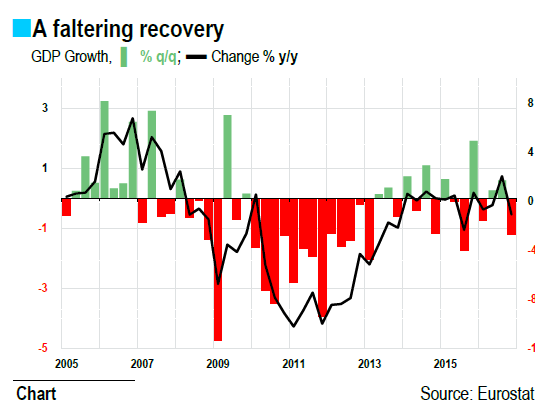- The Greek government has agreed to introduce additional savings measures in 2019 and 2020.
- European creditors have indicated that they are close to agreement. The IMF is satisfied, but is calling for further discussions about the sustainability of Greek debt before entering into a new programme.
- The consequences of these delays for the economic situation are beginning to be felt.
The chances of reaching an agreement to conclude the second review of the financing programme increased following the “political” agreement reached in Malta at the latest Eurogroup meeting in early April. The agreement hinges on fiscal adjustments that the Greek government has agreed to legislate for straight away to reassure its creditors, particularly the IMF, that it will be able to produce a primary budget surplus of 3.5% of GDP over the medium term, i.e. beyond 2018, the date at which the European financing programme ends. To achieve this, the Tsipras government has accepted a programme of measures worth 2% of GDP.1 A new adjustment to the pensions system will generate savings of 1 point of GDP in 2019, whilst income tax reforms will broaden the tax base and add a further 1 point of GDP in 2020. In return for these efforts2 the Greek government will be free, if it exceeds fiscal targets, to use any excess revenues for fiscal stimulus measures, thus offsetting, in part at least, the impact of the reforms.
Still several fuzzy areas
In Malta, the Chairman of the Eurogroup Jeroen Dijsselbloem called this progress very promising, indicating that the technical teams soon to return to Athens would only have to settle points of detail. The IMF also welcomed the substantial progress made, but emphasised that these advances alone will not answer the questions about the sustainability of Greek debt. The Fund believes that discussions should now continue with eurozone countries and is seeking assurances on a “credible strategy for restoring the sustainability of the debt” before it recommends involvement in a new program to its Board of Governors. Although Christine Lagarde said this week that she was optimistic she also stressed that the agreement on reforms meant that talks were only “halfway through”. The rest of the journey will focus on discussion on the debt reductions that the Europeans will be ready to grant Greece at the end of the programme. She nevertheless took a significant step towards the European position in declaring that the scope of restructuring does not necessarily have to be decided yet, but that the modalities will have to be laid out in advance. Under these circumstances, two scenarios seem possible. If the Europeans agree to distinguish the question of the IMF’s involvement from the conclusion of the second review, the latter could be achieved fairly rapidly. On their return to Athens, the technical teams could finalise the parameters of future reforms within days or weeks. This would open the way to a resumption of payments from the European Stability Mechanism to the Greek government, for which such a move is essential if it is to repay more than six billion euros to the ECB and private investors in July. However, if the Europeans, and in particular Germany, persist in interlinking these two elements (the IMF’s involvement and the payment of a new tranche of the programme) the clock will carry on ticking down and uncertainty could last for a few more weeks.

Economic recovery meets headwinds
All these delays are generating mistrust from households, firms and investors. They have an economic cost, which, though still moderate, is starting to be felt. A first warning sign came at the beginning of the year, when it became clear that the economic recovery stalled briefly at the end of 2016, with GDP contracting (-1.2% q/q) due to a drop in government spending and a tightening of consumer spending and company investment. Although it has been limited, a return to falling bank deposits from companies and households (down EUR1.6 billion over Q1 for private resident deposits) since the beginning of 2017 constitutes the second warning. At this stage, although we have downgraded our growth estimate for 2017 (to around 1.5%), this is above all to take account of a very unfavourable picture in accrued growth at the end of 2016. Delay too long, and the emergence of real fears about the ability of the parties involved to reach agreement before the end of July could change the picture once again. To avoid disrupting the positive momentum that seemed to have built up during 2016, a conclusion is becoming urgent.
by Frédérique CERISIER
